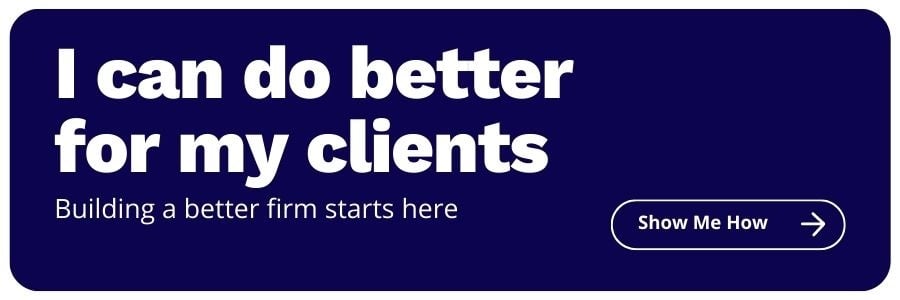The Who, What, and Why of Hiring a Business Coach
Share this
I have a Big Hairy Audacious Goal for my financial planning firm. I want to become the premier financial planning firm for women in tech on the west coast. Or the premier financial planning firm on the west coast for women in tech. Or something like that. Regardless, it’s approximately (add the 2, carry the 1…) a million miles from where I am now (which is “breakeven by year’s end! whoo!”).
I launched my practice in May of this year with the vague notion of creating a solo practice that brought home a respectable income for my family. The more I got into the women in tech community (my niche), the more I recognized the need for financial guidance and especially for financial guidance that was part of a larger message of professional and financial empowerment.
Once I’d been sitting with this knowledge for a while, my sense of what my firm could be started to grow, until finally one day, my BHAG sprang, like a not-quite fully formed Athena, from my head. And I immediately knew I needed help. In the form of a business coach. I think.
I mean, that’s what business coaches do, right? Help us grow us our businesses? Right? Maybe? Point is, I had precious little idea what a business coach did. Or how to find them. Or how they work. Or how much they cost. Or how to choose one.
And I realized right then, that this must be exactly what our prospective clients go through when looking for a financial planner.
So, not only did my search for a business coach land me with a coach whom I’m excited to work with and am confident will help me grow my business, but it also gave me a new appreciation of what prospective clients of ours go through, and what helps or hurts our attempts to win clients. And I think that’s a valuable lens through which to view my search for a business coach.
Problems with the “Profession”
I was anxious about finding a business coach. And that anxiety lay primarily in the fact that “business coach” has very little meaning. Certainly no legal meaning. Just like financial planning, “coaching” strikes me as not yet a profession.
Let’s think about doctors. If you’re looking for one, you know that someone with an “M.D.” after her name will have a certain minimum level of competence. Everyone you know has a doctor they have opinions about. Doctors are subject to certain educational and ethical constraints. And you can judge success pretty easily: “I was sick. Then the doctor prescribed me medicine. Now I am better.”
But for business coaches (or financial planners for that matter), there is:
- No single designation that shouts “I am a competent professional” (at least, none that the general public knows about)
- No minimum training or education necessary to call yourself by that name
- So few people use them that it’s not generally understood what the experience should be
- No minimum set of competencies we can rely on such a professional to have
- No easily quantifiable way to judge success
Figuring Out The Profession for Myself
So, I had to figure out, from scratch, what a business coach is, what they do, and how they can help me. I needed to talk to several coaches in order to first “triangulate” on what business coaches, in general, do. Then, once I established that a business coach is indeed the professional I need, I had to find the right one for me.
Here’s what I did, and how I think you can find the best business coach for you and your firm:
Step 1. Get clear about you want from a business coach.
This was pretty easy for me, as my exploding BHAG inspired the hunt in the first place. I want a business coach who can help me achieve that goal. And hopefully refine it along the way.
Step 2. Identify a bunch of reasonable planners.
Thankfully, the XYPN Radio VIP Facebook community (what a mouthful! Henceforth “VIP”) exploded with recommendations. Between those, a tip from a mastermind friend, and one from the tech community, I had about 10 recommendations in just a few days.
I winnowed it down (to 5) by taking the recommendations that were most detailed about how the coach was awesome. In our world, when clients refer a friend to us, if she says “Oh, you should talk to my planner! She’s great!” that’s not nearly as effective as saying “Oh, you should talk to my planner! She helped me evaluate my new job offer, choose all my employee benefits, and get me started in my new 401(k).” Turns out that’s universal.
My five included:
- Three who specialize in financial planners. Two of those are former or current advisors themselves and focus on advisors working primarily with women
- One is “industry agnostic”
- One is affiliated with the tech industry (I thought that might be a helpful perspective given my niche)
Step 3. Interview the heck out of ‘em.
Each of these coaches had a different process for prospective clients -- how much time they spent in the initial consultation, what additional materials they sent to me (if any), questions they asked in the initial consultation -- and a different twist on how they would work with me. But there were commonalities among them all that allowed me to figure out well enough what it is a business coach does.
I was lucky enough to interview one coach (the industry-agnostic one) who right away realized she was not the right kind of coach for me and went on to explain the different kind of coaches out there--life, business, and leadership--and that I should indeed be looking for a business coach, and that I should go with one specific to my industry. This woman spent 30 minutes of her time helping me out, with no expectation of getting my business, and I was so grateful. I sometimes spend a lot of time doling out free guidance or advice to people seeking financial help. And honestly, I get a bit weary of it sometimes. But this reminded me of what value it brings to people at so little cost to myself. (And of course, if anyone ever asks my advice for a leadership coach, you can bet your bippy that I’ll send them over to Nathalie Salles.)
When you talk with the coaches, ask the hard questions that will allow you to make a reasonable judgment of how they can help you. At the prices business coaches charge, and with your own firm on the line, this is not the time to be coy. (I might have verged on “rude” asking one of the coaches if she typically talks this much, but I had to know the answer and I couldn’t think of a softer way to ask. She was unfazed.)
Like these:
- Here’s my goal/problem. Do you help people do that?
- How would you help me accomplish my goal/solve my problem?
- What would it look like for us to work together?
- How much and how do you charge?
- How do you hold me accountable?
- How can you serve me better than other business coaches?
- How will I know when I outgrow your services? (A VIP member suggested this, and every coach I asked this of loved the question...and was kind of stumped by it.)
Another VIP member suggested I look for coaches whose compensation model aligns their payment with my success. Which sounds good. But I didn’t see any coach that does it that way. They’re all some version of pay-by-the-hour.
Step 4. Take a few days to reflect on the interaction.
You will ideally be working pretty intensely with this coach, so let your gut guide you.
- Did they interview me as much as I interviewed them? Did I feel they really listened to you?
- How did I feel talking with them? Comfortable? Encouraged? Stressed out? Defensive?
- Did they offer any guidance or ideas that could help me see how I could make progress?
In my search, the two coaches who specialized in financial advisors and are/were advisors themselves stood out. They were both able to articulate fairly specifically how they would work with me, what challenges an advisory firm has, etc. Both provided a lot of value in that initial consultation. But after I ruminated on it gently for a couple of days, I realized that I felt more comfortable with one. And that decided it.
Services and Cost
The coaches all have different service models. The three who specialize in financial advisors offer:
- Twice a month, 45 minutes each time (don’t know about email support)
- Starter kit of three meetings, to be used within three months, 60-75 minutes each time with substantial follow-up notes, limited email support
- My choice of once, twice, or three times a month, 90 minutes each time, unlimited email support in between. Nine-month engagement, with a tenth month for free if you pay upfront.
Business coaching isn’t cheap, it turns out. It’s going to run you about $250-350/hr of face time. I just paid $1200 for that starter kit of three meetings.
The Coach I Chose
The coach I chose persuaded me by doing these things:
Before our introductory meeting, she sent me documents detailing the areas of focus she has helped other clients work through, how the relationship would work logistically, next steps, and her service models and fees.
During our introductory meeting, she was willing to stay on the phone with me for as long as was necessary to finish the conversation (well, I suppose up to a limit, but it lasted 45 minutes), she listened actively, and was enthusiastic about my BHAG, my ideas, and my prospects.
She started giving me little insights into how she might help me. Saying for example, that my podcast idea was great, but perhaps more of a “Phase 2” idea, whereas “Phase 1” is more focused on just getting some damn clients. Good point, good point.
After our introductory meeting, she followed up the meeting that very day with an email containing three pages (three!) of notes from our call and her thoughts.
Why did this mean so much to me?
I felt an easy connection with her on the phone. I felt respected as a professional and firm owner, even though I’m only 7 months into this thing.
She was able to put some specifics, some quantifiable understanding around what she does and how she can help me. With that, she took care of my main source of uncertainty and anxiety.
She showed me she was not only listening, but doing so effectively. And she started to give me a window into how she can help me, specifically, start making progress towards my BHAG.
Implications for My (and Your?) Financial Planning Practice
We often hear that the value of financial planning is hard to quantify for clients and prospective clients. “We provide peace of mind” or “We optimize your finances” or “We worry so you don’t have to.” That is just so….not persuasive.
Well, my coach managed to persuade me. If I want to do the same for my prospective clients, my process might look like this:
- Email my Client Service Calendar and the document detailing my firm’s financial planning process. Maybe I even need a document that lists common questions or challenges that I help clients with, and a document listing my prices (already on my website).
- During the meeting, reflect back to them the problems that drove them to me, and mention ideas I have to possibly address those problems.
- After the meeting, send an email summarizing the meeting, calling out the important points, showing that I was listening carefully, and continuing to provide value by sending them resources or ideas about their specific pain points.
Such a process would proactively answer the questions prospective clients have, even if they don’t voice them: “What is financial planning? What would a relationship with you look like? How much do you charge? Do you help people in my position? How would you serve me better than other advisors? How do you keep me accountable? How do I know if it’s working?”
My coach enabled me to envision more exactly how she could help me, which made the not-insubstantial price tag seem worth it. Hopefully I can do the same for my prospective clients.

About the Author: Meg Bartelt is the President of Flow Financial Planning, LLC, a fee-only virtual firm that provides financial guidance and support to working mothers in high tech. Learn more on her website and on her blog
Share this
- Advisor Blog (697)
- Financial Advisors (222)
- Growing an RIA (121)
- Digital Marketing (87)
- Marketing (84)
- Community (81)
- Business Development (78)
- Start an RIA (76)
- Coaching (72)
- Running an RIA (71)
- Compliance (69)
- Client Acquisition (65)
- Technology (65)
- Entrepreneurship (61)
- XYPN LIVE (59)
- Sales (49)
- Practice Management (44)
- Client Engagement (41)
- Bookkeeping (40)
- Investment Management (40)
- XYPN Books (38)
- Fee-only advisor (37)
- Scaling an RIA (33)
- Employee Engagement (31)
- Lifestyle, Family, & Personal Finance (31)
- Financial Education & Resources (27)
- Client Services (26)
- Journey Makers (21)
- Market Trends (21)
- Process (14)
- Niche (11)
- SEO (9)
- Career Change (8)
- Partnership (7)
- Transitioning Your Business (7)
- Sapphire (4)
- Transitioning To Fee-Only (4)
- Social Media (3)
- Transitioning Clients (3)
- Emerald (2)
- Persona (2)
- RIA (2)
- Onboarding (1)
Subscribe by email
You May Also Like
These Related Stories

How To Pick A Business Coach - What Would Arlene Say?
Aug 31, 2017
5 min read

A Sabbatical Journey: 4 Powerful Lessons for Independent Advisors
Jan 2, 2023
8 min read






